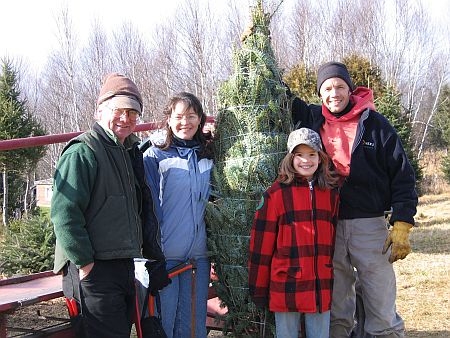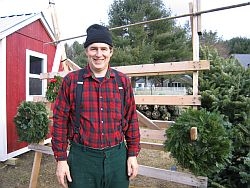 (Host) Dairy farms may be on the wane in Vermont, but Christmas tree growing is still profitable, and there’s increasing demand for organically grown species.
(Host) Dairy farms may be on the wane in Vermont, but Christmas tree growing is still profitable, and there’s increasing demand for organically grown species.
Caledonia County, in the Northeast Kingdom, rates first in the state for the number of holiday trees sold annually, according to the US Department of Agriculture.
VPR’s Charlotte Albright visited the Northeast Kingdom over the weekend.
(Albright) Christmas trees have been sprouting in roadside retail stands and "cut-your own" fields since Thanksgiving weekend. That’s when Adam Parke was loading his organically grown evergreens onto tractor-trailers bound for New York City. Taking a hot tea break near the woodstove in his cozy Barton kitchen, he says he launched his export business in the mid 1990s, after he got out of dairy farming.
(Parke) "Got started in Brooklyn in a somewhat Mafia neighborhood-a little dangerous at first, but then I met people and gradually expanded and now I have five lots down there where I sell trees and take quite a crew of Vermonters down to work every year."
(Albright) Parke’s roughly 5,000 trees dot spectacularly scenic landscape above May Pond, the source of Barton’s drinking water. He never uses herbicides or pesticides, so it takes some time for them to fight their way into maturity, and not every tree makes it. Parke says he doesn’t charge extra for the organic label, but he says his city slicker customers, spotting a $70 or $80 price tag, used to ask, "Why should I buy an organic tree? I’m not going to eat it." Now, he says, that’s changing.
(Parke) "Gradually over the last five or six years I’ve had people come to us looking for organic trees and thank us for growing organic trees, some just because of the principle of it and others because they have family members who are hypersensitive to chemicals in the house."
(Albright) In addition to supporting himself, Parke employs about 25 young salespeople who sell out of his five city lots. He’s not the only organic tree grower in the Northeast Kingdom who fetches New York prices. But others, like Steve Parker, would rather sell to locals, who cut their own trees on his land in Danville.
(Parker) "I consider it my mission to sell a really good tree at a really good price that just about any neighbor can afford to buy. I’m not getting fancy New York prices, I’m getting really reasonable Northeast Kingdom prices. But I’m trying to make the farm work ecologically and economically at the same time."
(Albright) Parker’s trees start as low as $10 apiece. He’s been growing them for more than 40 years on the farm where his parents learned that hilly land is better suited for trees than cows. Parker uses an old fashioned method called "stump culture." Instead of cutting the whole tree down, he leaves the stump in the ground so it can sprout new growth. It’s both ecological and economical because he doesn’t have to wait years for transplanted seedlings to mature. They grow fast on the established root stock, about three feet above the ground-a convenient spot, he notes, for an amateur cutter to plant his hacksaw-waist high, above the snow cover.
(Christmas tree shoppers "I think we have a winner!)
(Albright) On a blustery Saturday, Parker’s next-door neighbors, Mike and Dana Boudreau and their daughter, Ryan, trudge up his thinly forested hill, hacksaw in hand, looking for the perfect specimen.
(Albright) Dana Boudreau says the yearly forays into this field are a cherished family tradition.
(Boudreau) "And these trees generally last here from Mr. Parker the month of December, with no problem, and plus it’s keeping everything local, and it’s our neighbor. Those other ones, God knows where they’ve come from. Like anything else, certain things you can do in mass production. Other things are much better off done by hand, right next door."
(Albright) Parker guides the tree through a mechanical baler, so it will slide easily into the Boudreaus’ truck. Meanwhile, another customer, buying for a general store in Morrisville, picks up the last of his wholesale order-130 trees. So the season, Parker says, is starting off pretty well.
 (Albright) About 10 miles away, on busy Route 5 Lyndonville, cut trees can run as much as $45 a piece, and in a tight economy, that can mean comparison shopping. Allen Young is an insurance adjuster who grows and sells trees more as a hobby than a career. He doesn’t use chemicals on his tree farm because, he says, he doesn’t really understand their effects or toxicity. But he doesn’t tout the trees as organic, either, because he says the certification process is cumbersome. For Young, selling Christmas trees keeps family land productive, and triggers a lower "current use" tax assessment. Besides, he says, it’s his turn to carry on the family tradition begun half a century ago by a grandfather who loaded their wild trees on trains to-you guessed it–New York City. These days, the Youngs stick to local retail.
(Albright) About 10 miles away, on busy Route 5 Lyndonville, cut trees can run as much as $45 a piece, and in a tight economy, that can mean comparison shopping. Allen Young is an insurance adjuster who grows and sells trees more as a hobby than a career. He doesn’t use chemicals on his tree farm because, he says, he doesn’t really understand their effects or toxicity. But he doesn’t tout the trees as organic, either, because he says the certification process is cumbersome. For Young, selling Christmas trees keeps family land productive, and triggers a lower "current use" tax assessment. Besides, he says, it’s his turn to carry on the family tradition begun half a century ago by a grandfather who loaded their wild trees on trains to-you guessed it–New York City. These days, the Youngs stick to local retail.
(Young) "Another brother had the business here before I did as my dad and the brother before him. They all got tired or distracted and moved onto other things. Perhaps I’m not smart enough yet so I’m still doing it, although I love it. It’s fun."
(Albright) In his red plaid shirt, suspenders, and black stocking cap, he sidles up to a customer peering at a stately Fraser Fir. She asks the price, and says she might be back. Like many small-scale tree farmers in the Kingdom, Young doesn’t expect to see much profit until the week before Christmas. But that’s a good time, he says, to pocket some cash.
For VPR News, I’m Charlotte Albright, in Caledonia County